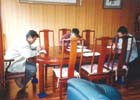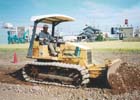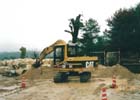Involvement in the foreigner
training and technical exercise
programsEvaluation Examination for Mechanized Construction
The foreigner training and technical exercise project is designed
to assist developing countries in acquiring up-to-date technology.
Under this system, Japanese industry receives, for a certain period,
young and middle-aged workers from developing countries. During this
period, they learn industrial technology, skills and knowledge. Through
these activities, this system will contribute to development of human
resources supporting the growth of these countries.
The Japan Construction Mechanization Association was accredited by
the Japan International Training Cooperation Organization (JITCO)*1
for the "technical evaluation system." Ever since 1993,
this association has been conducting examinations for foreign trainees
in the mechanized construction area (earth moving and leveling, loading,
excavation and compaction).
The evaluation examination has three classes: the beginner class,
the intermediate class and the specialist class. Participants in the
foreign training program are required to pass the beginner-class examination
to be enrolled in the technical exercise course*2. The beginner class
corresponds to Basic Class 2 in the technical skill test pursuant
to the Human Resources Development Promotion Law.
|
*1
|
Established in 1991, the JITCO
is a public service corporation under the control of five ministries:
the Ministry of Justice, the Ministry of Foreign Affairs, the
Ministry of Health, Labor and Welfare, the Ministry of Economy,
Trade and Industry and the Ministry of Land, Infrastructure
and Transport. It is intended to contribute to sound and smooth
promotion of the foreigner training and technical exercise programs. |
|
*2
|
According to the Immigration Control and Refugee
Recognition Law (hereinafter referred to as the Law), foreign
trainees have a residence status of "training," which
permits them non-labor "activities for acquiring technology,
skills or knowledge after being admitted to a public or private
institution in Japan." In contrast, technical exercise
participants have a residence status of "specific activities,"
which allows them to conclude an employment contract with their
training offering company and to receive remuneration. In order
to obtain this status, they have to meet all three requirements
set forth by the Law, including passing an evaluation examination
within a designated period after a specific duration of training.
Those technical exercise participants with the residence status
of "designated activities" are entitled to stay in
Japan for a maximum of three years including the training period. |
The numbers of successful candidates for
the beginners class examination (1993-2003)
|
Year
|
93
|
94
|
95
|
96
|
97
|
98
|
99
|
00
|
01
|
02
|
03
|
Total
|
|
Examinations
conducted
|
5
|
10
|
11
|
16
|
22
|
15
|
12
|
17
|
10
|
18
|
15
|
151
|
|
Number of
candidates
|
37
|
47
|
48
|
59
|
64
|
49
|
49
|
66
|
32
|
70
|
46
|
567
|
|
Number of
successful
candidates
|
37
|
47
|
48
|
59
|
64
|
49
|
49
|
66
|
32
|
70
|
46
|
567
|
|
|
P.R. China
|
11
|
47
|
32
|
48
|
50
|
39
|
39
|
49
|
18
|
58
|
30
|
421
|
|
Indonesia
|
0
|
0
|
0
|
8
|
13
|
10
|
10
|
13
|
14
|
5
|
10
|
83
|
|
Thailand
|
26
|
0
|
0
|
0
|
0
|
0
|
0
|
0
|
0
|
0
|
0
|
26
|
|
Peru
|
0
|
0
|
10
|
0
|
0
|
0
|
0
|
0
|
0
|
0
|
0
|
10
|
|
Vietnam
|
0
|
0
|
4
|
3
|
0
|
0
|
0
|
2
|
0
|
7
|
4
|
20
|
|
The Philippines
|
0
|
0
|
2
|
0
|
1
|
0
|
0
|
2
|
0
|
0
|
2
|
7
|
|
|
Type 1:
Earth moving
and leveling
|
8
|
6
|
2
|
2
|
6
|
3
|
0
|
0
|
2
|
8
|
0
|
37
|
|
Type 2:
Loading
|
7
|
0
|
0
|
3
|
0
|
7
|
5
|
4
|
1
|
10
|
5
|
42
|
|
Type 3:
Excavation
|
22
|
41
|
46
|
45
|
55
|
37
|
44
|
62
|
29
|
52
|
39
|
472
|
|
Type 4:
Compaction
|
0
|
0
|
0
|
9
|
3
|
2
|
0
|
0
|
0
|
0
|
2
|
16
|
|
|
|





